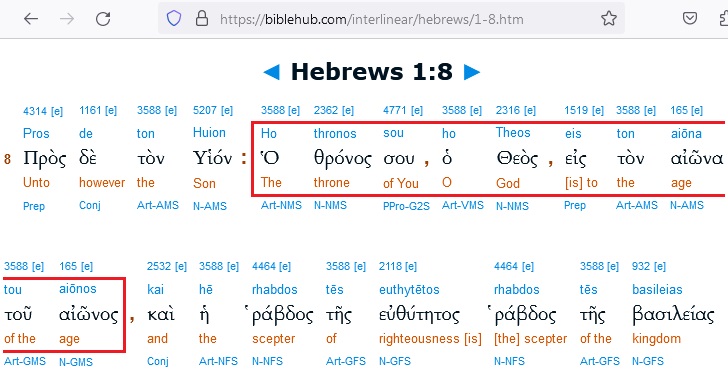John 20 & Hebrews 1
John 20:17 & Hebrews 1:8,10-12
John 20:17 & Hebrews 1:8,10-12
 Here
is how to cite Hebrews 1:8,10,11,12 to refute the Jehovah's Witnesses'
false claim that John 20:17 precludes Jesus being God.
Here
is how to cite Hebrews 1:8,10,11,12 to refute the Jehovah's Witnesses'
false claim that John 20:17 precludes Jesus being God.
Jehovah's Witness - Please read John 20:17 in
my translation.
Christian - "Jesus said to her: 'Stop clinging
to me, for I have not yet ascended to the Father. But go to my brothers and say
to them, "I am ascending to my Father and your Father and to my God and your
God." ' "
Jehovah's Witness - You see, how can Jesus be God when
he calls God "my God"?
Christian - Because Jesus is God the Son and God the
Father is God the Father, Jesus calls God the Father, "God," as in
God the
Father, and God the Father calls Jesus, "God," as in God the Son.
Jehovah's Witness - What? When did God ever call Jesus,
"God"?
Christian - In Hebrews 1:8, which reads, "But to the
Son He says: 'Your throne, O God, is forever and ever, and a scepter of
righteousness is the scepter of Your kingdom.' "
Jehovah's Witness - But my translation of Hebrews 1:8 says, "But about the Son, he says: 'God is your throne forever and ever, and the scepter of your Kingdom is the scepter of uprightness.' " So it says, "God is your throne," not, "Your throne, O God."
Christian - "Your throne, O God" is correct for three reasons. First, as you can see below and on this page, the original Greek says, "throne of You" - ie. Your throne - "O God":

Christian - As you can see above, there is no verb in the phrase, "The throne of you, O God," and the article "ho" (the) in front of "throne" precludes it from being a predicate (remind him that the importance of this grammatical detail was already covered in the discussion of John 1:1). This is why, as seen on this page, all other English translations correctly translate this phrase as "Your throne, O God."
Second, compare these two sentences:
"Your throne, O God, is forever and ever, and a scepter of
righteousness is the scepter of Your kingdom."
"God is your throne forever and ever, and the
scepter of your Kingdom is the scepter of uprightness."
The sentence on top flows and coherently pairs "throne" and "scepter," both signs of reigning over a "kingdom," while the sentence on the bottom is awkward and incoherent.
Third, "Your throne, O God, is forever and ever" means His reign, which "throne" represents, will last forever, and thus makes sense. On the other hand, 'God is your reign' doesn't make sense, so the "throne" in "God is your throne" remains in its literal meaning of a chair on which a king sits, and the sentence "God is your throne forever and ever" makes no sense unless you are supposed to be sitting on top of God forever and ever.
It should also be noted that the Greek word translated "about" in the phrase "But about the Son" in your translation is "πρὸς" (pros), which more commonly means "to, towards, unto." Since God the Father is talking not only about Jesus but also "to" Jesus in verse 8, the correct translation of that phrase is, "But to the Son He says."
Jehovah's Witness - Are we even sure that God is
being quoted in this verse?
Christian - Of course. Please just read this chapter
from verse 1 to see for yourself.
(Give him time to read Hebrews 1:1-7 and confirm for himself that God the Father is indeed speaking to Jesus.)
Christian - And it gets even more precise. Please read what God the Father
says to Jesus next in verses 10 to 12 in your translation.
Jehovah's Witness - "At the beginning,
O Lord, you laid the foundations of the earth, and the heavens are the works of
your hands. They will perish, but you will remain; and just like a garment, they
will all wear out, and you will wrap them up just as a cloak, as a garment, and
they will be changed. But you are the same, and your years will never come to an
end."
Christian - Now, please turn to Psalm 102 and read
verses 25 to 27 in your translation.
Jehovah's Witness - "Long ago you laid the foundations of the earth, and the
heavens are the work of your hands. They will perish, but you will remain; Just
like a garment they will all wear out. Just like clothing you will replace them,
and they will pass away. But you are the same, and your years will never end."
Christian - So Hebrews 1:10-12 is echoing Psalm 102:25-27, isn't it?
Jehovah's Witness - Yes.
Christian - Could you please scroll up on Psalm 102
and read verse 1 in your
translation?
Jehovah's Witness - "O Jehovah, hear my prayer; Let my cry for help reach
you."
Christian - So to whom is this Psalm addressed?
Jehovah's Witness - "Jehovah."
Christian - So let's recap - who is God the Father
addressing in Hebrews 1:10-12?
Jehovah's Witness - Jesus.
Christian - And God the Father's description of Jesus in
Hebrews 1:10-12 matches the description of whom in the Old Testament?
Jehovah's Witness - Jehovah.
Christian - So God the Father is describing
Jesus as "Jehovah," just as Jesus referred to Himself as "Jehovah" in
Revelation 1:17-18, isn't He?
Jehovah's Witness - Yes.